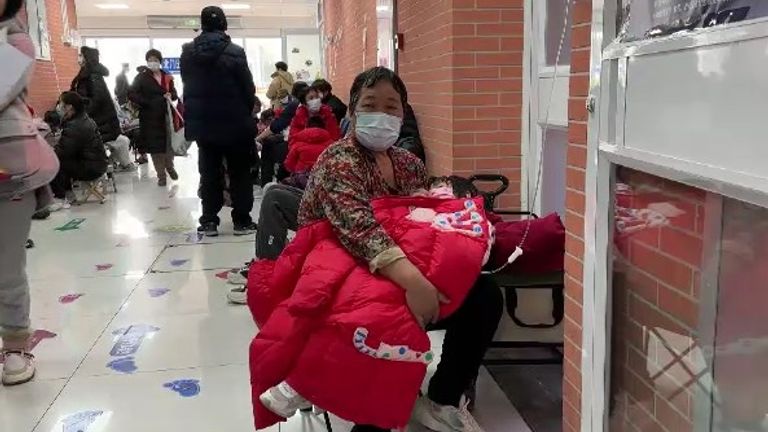In China’s hospitals, the patients keep coming.
Children mostly, thousands of them, many visibly very unwell.
In one hospital in Beijing, the lobby is packed. Dozens of families sit along the walls waiting, some on stools they had brought from home, others on the floor.
Many have been hooked up to IV drips in the corridors, others are wrapped in blankets and cradled by their weary-looking parents.
This hospital is so busy it’s no longer taking online or telephone appointments.
People have no choice but to turn up, wait and worry about their children who are suffering from a surge in various respiratory illnesses such as flu, “walking pneumonia” and RSV.
Outside another hospital, we meet Jiang Roumin and her 10-year-old grandson Zhang Zhixun.
He’s been badly ill for over a week, and has been back here multiple times.
“I want to cough, I feel uncomfortable with my nose and it’s runny,” he tells us before coughing violently.
Jiang Roumin and her 10-year-old grandson Zhang Zhixun, who has been badly ill for more than a week
“They’ve not found the cause of his fever,” says his grandmother. “We’ve tried many kinds of medicine but it’s not helped. Every day he has a fever as high as 38, 39 even 40 degrees.”
“Of course I am worried. He can’t go to school. He can’t go anywhere. He’s just been lying in bed for six, seven days.”
Two-thirds of Zhang’s classmates are also off sick, while across multiple Chinese cities, some classes have reverted to being taught online.
Read more:
‘Walking pneumonia’ in China – as other nations see spike in infections
What we know about the unexplained respiratory illness in China
Mystery illness is from flu and other pathogens, China says

Thousands of children are among patients waiting for treatment

Patients face waiting for hours at under-pressure hospitals
Fears grow inside and outside China
The official line and the one run at length on state TV in recent days is that people should not be too concerned about the wave of infections, they should take care and take precautions, but avoid rushing to hospitals if they can.
But that has not stopped people worrying both inside and outside China.
Indeed last week, ProMED, an international disease monitoring organisation, put out a notice flagging the emergence of a mysterious “undiagnosed pneumonia”.
The World Health Organization (WHO) was concerned enough that it put out a public call for China to provide more information.
Both the Chinese authorities and WHO now say the relevant data has been exchanged and there is no new virus at play.
But perhaps understandably, there has still been a degree of scepticism.

A wheelchair user with a plastic covering, as patients take extra precautions while they wait for treatment
China covered up the start of both COVID-19 and SARS, while the WHO was accused of complacency in its dealings with Beijing.
What’s happening now is provoking uncomfortable memories for many of the scenes seen in Wuhan and elsewhere when the pandemic was first ripping through China’s population.
Both it seems are now at pains to demonstrate that this time they’re behaving transparently – and most experts also agree that there’s nothing to suggest anything untoward is going on and nothing that indicates there are any new pathogens circulating.
COVID lockdowns could have caused respiratory illness surge
In fact, extreme and lengthy COVID lockdowns in China could well be the cause of what’s happening now.

Professor Peter Openshaw says lengthy COVID lockdowns could have caused the surge in respiratory illnesses
Peter Openshaw, professor of experimental medicine at Imperial College London, explained: “Normally during the early period of childhood, you build up a level of immunity to a range of different pathogens.
“But because lockdown was so strict in China for so long, there are now quite a lot of people who either have waning immunity, or otherwise it’s drifting down in terms of its ability to protect or people who have never actually encountered these viruses.
“They need to catch up basically in terms of getting infected and suffering some disease.”
It is also important to retain perspective – busy hospitals are not uncommon in China and there are limited GP equivalents here meaning people are much quicker to present at hospital – often for something as small as a cold or a sore throat.
At this time of year, services are often strained, so it is not necessarily a sign of a major unfolding crisis.
But nonetheless, there are a lot of anxious parents and a lot of poorly children.
This content is provided by Spreaker, which may be using cookies and other technologies.
To show you this content, we need your permission to use cookies.
You can use the buttons below to amend your preferences to enable Spreaker cookies or to allow those cookies just once.
You can change your settings at any time via the Privacy Options.
Unfortunately we have been unable to verify if you have consented to Spreaker cookies.
To view this content you can use the button below to allow Spreaker cookies for this session only.
Click to subscribe to the Sky News Daily wherever you get your podcasts
China has not yet reported any deaths from this wave of disease, but experts say they are possible.
The system is not succumbing but strained, and it’s under pressure to tell the truth.







